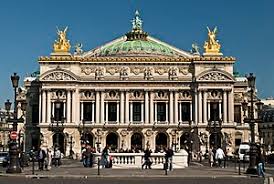It took my breath away.
- Cindy and Abby
- Jun 18, 2019
- 2 min read
Just like when I walked into the Sistine Chapel. I actually cried that time. But after so much time spent in Paris, I had never been to the Palais Garnier, the Paris Opera house, and one of the most spectacularly ornate and incredible buildings I've ever seen. But the Chagall ceiling...wow.

"Having lived in his adopted country of France for more than five decades, in 1963 Marc Chagall was commissioned to paint the new ceiling for the Paris Opera, a majestic 19th-century building built by Napoleon III and considered a national monument. André Malraux, France’s Minister of Culture wanted something unique and decided Chagall would be the ideal artist after seeing Chagall’s work in Daphnis et Chloe. This choice however caused controversy as some objected to having a Russian Jew decorate a French national monument and others disliked the ceiling of the historic building being painted by a modern artist.
Nonetheless, Marc Chagall continued the project from January to July 1964. The final canvas was nearly 2,400 square feet and required 440 pounds of paint. It had five sections which were glued to polyester panels and hoisted up to the 70-foot ceiling. Unveiled on September 23, 1964 with a celebratory performance of the same Daphnis et Chloe that inspired his commission, the work drew critical acclaim for its color and poetry. Creating the masterpiece as a gift to Paris, Chagall refused to accept compensation for his work.
There is no logic of time or space in the choice of themes, figures and symbols on his ceiling. The images Chagall painted paid tribute to the composers with scenes from Mozart’s The Magic Flute, Wagner’s Tristan and Isolde, Mussorgsky’s Boris Godunov, Berlioz’s Romeo and Juliette, Ravel’s Daphnis and Chloe, Stravinsky’s The Firebird, Tchaikovsky’s Swan Lake, and Adam’s Giselle; Paris’ monuments such as the Tour Eiffel, the Opera Garnier, Place de la Concorde, Arc de Triomphe and typical Parisian rows of houses on the riverside; French musicians such as Rameau, Debussy, Pelléas, and Mélisande; plays such as Carmen, Orfeo, Fidelio, and Verdi; famous composers such as Gluck and Beethoven; and the typical Chagall motifs of angels, lovers, animals, fauns and satyrs. All of which Chagall manages to combine in the same space through the use of wonderful rich colors, an echo of his long experience with the world of theatre."
Some pictures from 2016. We visited during a rehearsal of a performance that apparently required full size nude mannequins suspended in lucite boxes! Kind of went with the ethereal figures painted on the ceiling.

















